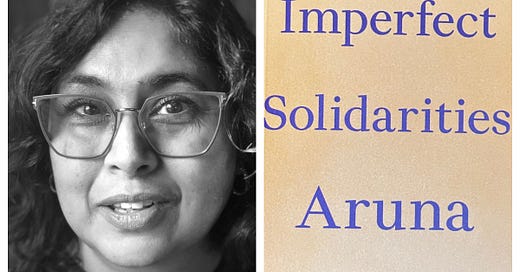Aruna D'Souza on why empathy isn't the answer
An argument for a better basis for political change
Photo credit: Dana Hoey
Art critic Aruna D’Souza’s slim (less than 90 pages) but impactful book, Imperfect Solidarities, makes a powerful and timely argument: Empathy is a poor basis for solidarity, certainly in the world in which we currently find ourselves. The genocide in Gaza provides a jumping-off point for the book and a means to frame the argument.
Her point: We need to shift our thinking towards a solidarity that’s based on our shared humanity, not whether you’ve been able to provoke a sympathetic emotional response from me. Here’s how she lays out the problem of relying on our capacity to relate to the pain of others to inspire political change:
…in our age of political atomization-the increasing difficulty, in the wake of neoliberalism, to see ourselves as part of the multitude-we have been trained to focus on the self, on our individuality, identity, and brand, above all else. Empathy becomes the perfect tool for political expression in such a landscape because it is predicated on individual transformation rather than collective action.
She goes on to make the following four points:
Requiring empathy is, in fact, "traumatic labor" for those suffering. Often those being asked to "perform" are in the midst of suffering violence or other injustice, so this "work" requirement comes at the least opportune moment, and often precisely when the person or people need the most help. Think of the countless videos of just-bombed Palestinians begging the world to intervene on their behalf.
The language of empathy can easily be perverted, especially on social media platforms. The tearful confessional video is a staple of TikTok, for example.
Requiring empathy as the basis of solidarity "often privileges the emotional response of those doing the witnessing, instead of the real conditions being experienced by people on the ground." In this scenario, what's most important is the emotional response of the person or people who view these outpourings of emotion.
Who–what people, what groups, what experiences–is deemed worthy of our empathy in the first place? For this last point, D’Souza notes:
Attempts to "humanize" the victims of Israel's violence is predicated on the idea that their humanity is not a given but has to be argued for...The attempts by peoples and governments to dehumanize should be treated as the problem requiring repair; instead, we put the burden on those who are being dehumanized to argue for their worthiness of empathy.
Using examples from art, literature, and exhibition-making, D'Souza asks us to consider a solidarity that’s not based on any full understanding, perfect translation, or deep insight into a person and their suffering, which is what lurks at the heart of our reliance on empathy.
Rather, the more urgent question is this: "What would it mean if our politics were based not on our ability to empathize with people whose experiences are distant from our own, but on our willingness to care for others just by virtue of their being beings?"
Questions of the moment, indeed.
Pick up your copy via Bookshop.org and support a local bookstore.



